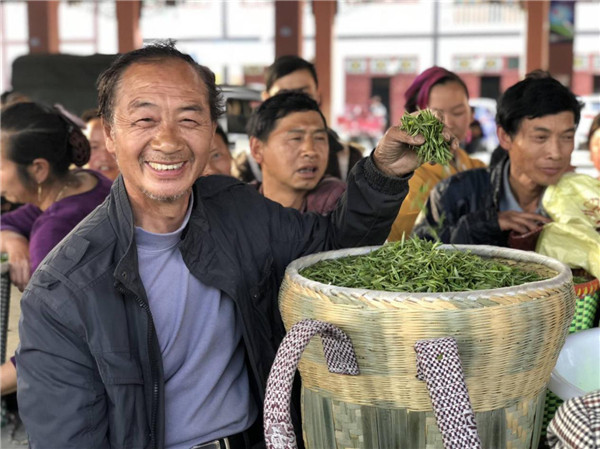
The mountainous Southwest Chinese province of Guizhou is considered by many to be the main battleground in China's crucial fight against poverty, but the province has scored many major victories in recent years, with many more on the horizon.
The province is striving to reduce poverty through infrastructure construction, relocation projects, rural industries and other measures. According to the latest data, which looks at the five years leading up to 2018, the number of people living below the poverty line in Guizhou fell by 6.7 million.
The province has recently devised a new method to help rural industries. Two villages in Zunyi city, Guizhou province joined forces to promote the tea industry as a means of reducing poverty.
Thirty-two residents of Shizhi village arrived at Hetaoba village on March 31 to learn about tea planting and marketing from local tea farmers.
 |
|
Residents from Shizhi village take a bus to Hetaoba village to learn about tea planting from local tea farmers. [Photo provided to chinadaily.com.cn] |
The two villages are located in adjoining counties. Shizhi village is an impoverished village which began to develop its tea industry last year, while Hetaoba village is known in western China for its ecological tea, with a planting area of more than 12,000 mu (800 hectares). Chen Tingming, the Party secretary of Hetaoba village, said that the development of the tea industry had the potential to bring about a better life for local villagers.
Crops in Hetaoba generally have a low yield due to the area's arid climate, but the tea trees introduced by the Guizhou Tea Research Institute were found to be suitable for the local climate and soil. In 1981, the once impoverished village began developing the industry.
Villagers in Hetaoba gained affluency by 1996. The village introduced four advanced tea enterprises to Guizhou and set up dozens of tea processing plants. Every year the village processes and sells more than 1,000 tons of tea across China and European countries.
 |
|
Tea farmers sell fresh tea leaves to merchants in Hetaoba village after a day's hard work. [Photo provided to chinadaily.com.cn] |
"Last year, the village's tea output reached 224 million yuan ($34.9 million), and the annual income of villagers exceeded 16,400 yuan," said Chen.
Yu Kunhui, a tea farmer in Hetaoba, manages a 10-mu tea garden with an annual income of no less than 50,000 yuan. He has been encouraged to teach two residents of Shizhi village about his experiences with tea planting.
"I will do my best to share my experiences with you and provide remote assistance through mobile phone in the future," Yu Kunhui said to the two residents.
The potential of tea farming has given Wang Daifu, one of the two residents, hope for the future. Previously, planting corn and rice in his two-mu plot only earned him 4,000 yuan a year.
"During the second half of the year, I want to start growing tea trees. I'm grateful for the opportunity to learn how to plant and manage a tea garden," said Wang.
The tea industry in Hetaoba village is transitioning from traditional agriculture to sightseeing agriculture, with the village planning to form a tourism industry around the developing tea farming culture.
Last year, the village received more than 80,000 tourists, and its tourism revenue exceeded ten million yuan.
"We have just signed an agreement with a Shenzhen-based tourism and development company to build the village into a popular scenic spot with catering, accommodation, entertainment, shopping and travelling," said Chen.